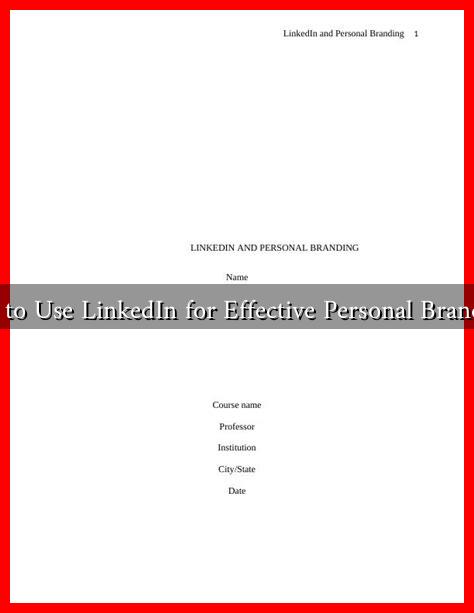-
Table of Contents
How to Use LinkedIn for Effective Personal Branding
In today’s digital age, personal branding is more important than ever, especially for professionals looking to advance their careers. LinkedIn, the world’s largest professional networking platform, offers a unique opportunity to build and showcase your personal brand. This article will explore effective strategies for leveraging LinkedIn to enhance your personal brand, supported by examples and statistics.
Understanding Personal Branding
Personal branding is the practice of marketing yourself and your career as a brand. It involves defining your unique value proposition, showcasing your skills, and establishing a reputation in your industry. According to a study by CareerBuilder, 70% of employers use social media to screen candidates, making it crucial to have a strong online presence.
Optimizing Your LinkedIn Profile
Your LinkedIn profile is your digital business card. To make a lasting impression, consider the following elements:
- Professional Photo: Use a high-quality, professional headshot. Profiles with photos receive 21 times more profile views and 36 times more messages.
- Compelling Headline: Your headline should reflect your current role and aspirations. Instead of just stating your job title, consider adding keywords that highlight your expertise.
- Engaging Summary: Write a summary that tells your story. Use a conversational tone and include your career achievements, skills, and what you’re passionate about.
- Experience and Skills: List relevant work experiences and skills. Use bullet points for clarity and include quantifiable achievements to demonstrate your impact.
- Recommendations: Request recommendations from colleagues and supervisors. A strong recommendation can enhance your credibility and showcase your strengths.
Building Your Network
Networking is a critical component of personal branding. Here are some strategies to expand your LinkedIn network:
- Connect with Industry Peers: Send personalized connection requests to colleagues, industry leaders, and alumni. Mention common interests or experiences to increase acceptance rates.
- Join Relevant Groups: Participate in LinkedIn groups related to your industry. Engaging in discussions can help you establish authority and connect with like-minded professionals.
- Attend Virtual Events: LinkedIn often hosts webinars and events. Attend these to learn and network with other attendees.
Creating and Sharing Valuable Content
Content creation is a powerful way to showcase your expertise and engage with your audience. Consider the following content strategies:
- Write Articles: Use LinkedIn’s publishing platform to write articles on topics relevant to your industry. This positions you as a thought leader and can attract followers.
- Share Insights: Regularly share industry news, insights, or personal experiences. This keeps your network engaged and demonstrates your knowledge.
- Engage with Others’ Content: Like, comment, and share posts from your connections. This not only builds relationships but also increases your visibility.
Measuring Your Impact
To understand the effectiveness of your personal branding efforts on LinkedIn, it’s essential to track your progress. LinkedIn provides analytics for your profile and posts, allowing you to see:
- Profile views and search appearances
- Engagement metrics on your posts (likes, comments, shares)
- Growth in connections and followers over time
By analyzing this data, you can refine your strategy and focus on what resonates with your audience.
Conclusion
Using LinkedIn for effective personal branding requires a strategic approach. By optimizing your profile, building a robust network, creating valuable content, and measuring your impact, you can establish a strong personal brand that sets you apart in your industry. Remember, personal branding is an ongoing process; stay active, engage with your network, and continuously refine your strategy to achieve long-term success.
For more insights on personal branding, consider visiting Forbes.

